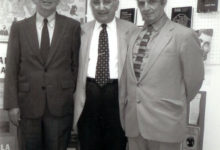NAASR joins with the Armenian and scholarly communities in marking the death of genocide scholar Dr. Vahakn Dadrian on August 2 at the age of 93. Dr. Dadrian was known all over the world as a pioneer in genocide and comparative genocide studies and in particular for his voluminous writings on the Armenian Genocide.
Vahakn N. Dadrian was born in Istanbul, Turkey, in 1926 and was educated at the University of Berlin, the University of Vienna, the University of Zürich, and received a Ph.D. in sociology from the University of Chicago. Since 1999 Dadrian had served as the Director of Research at the Zoryan Institute.
“The more I research on Armenian Genocide, the more new documents come to light from the Ottoman Archives, the more I am convinced of his sharpness and analysis,” reflected Prof. Taner Akçam. “There is no doubt that whatever discussions we’ll have in the future will be built on the body of knowledge that Dadrian has provided for us.”
“When we look at the remarkable development of Armenian Genocide scholarship in the past two decades, it must be understood that this was made possible by the foundation created by Dadrian’s groundbreaking work,” commented NAASR Director of Academic Affairs Marc A. Mamigonian. “More than anyone else at the time, Dadrian raised the study of the Armenian Genocide to the academic level, and everyone who has come after him is indebted to his work–even those who disagree with him.”
Dadrian was the author of several noteworthy books including The History of the Armenian Genocide: Ethnic Conflict from the Balkans to Anatolia to the Caucasus (1995), Warrant for Genocide (1999), and Judgment at Istanbul: The Armenian Genocide Trials (co-authored with Taner Akçam, 2011), as well as dozens of scholarly articles published in numerous languages around the world. He reflected on his own path as a scholar in the volume Pioneers of Genocide Studies, edited by Samuel Totten and Steven L. Jacobs (2002).
Dr. Dadrian was the recipient of many honors and awards, including the Khorenatsi Medal, Armenia’s highest cultural award. He was inducted into the ranks of the Academy of Sciences of the Republic of Armenia in 1998.

